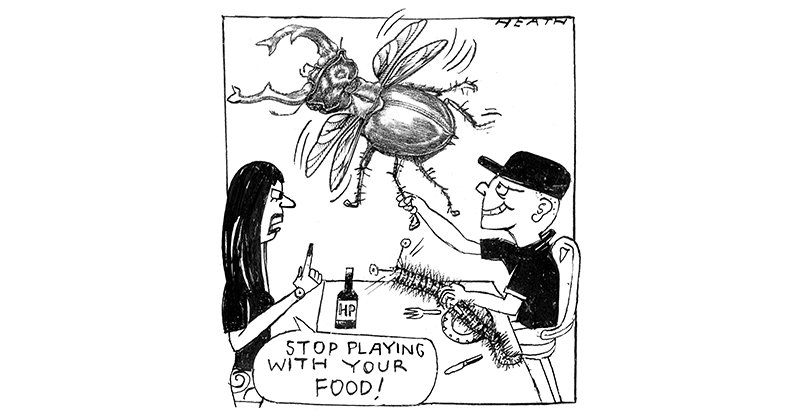I’ve lost track of the number of features I’ve seen joyfully hailing the edible insect revolution, entitled ‘Grub’s up!’ Barclays has released a report which predicts that the market for edible insects will hit $8 billion by 2030, and you can already buy Smoky BBQ Crunchy Roasted Crickets in Sainsbury’s. Research last month showed that certain species of edible insect contain higher quantities of antioxidants than freshly squeezed orange juice. Bugs are officially on track to become not just the ethical and environmental solution to protein provision, but a superfood as well.
But wait. As with most food fads, these pronunciations are coming early, and are based on scant evidence. Everyone longs to believe that edible insects are the answer, now that we know what a toll the meat industry takes on the environment. And there’s no question that meat production is a major cause of environmental change, driving deforestation and production of greenhouse gases. But a close look at the bugs reveals that they might not be quite the answer everyone’s looking for.
The impetus driving the popularisation of edible insects is the belief that they can provide equivalent quantities of protein with a significantly lower environmental footprint than traditional sources such as poultry and livestock. On the face of it, there is compelling evidence to support this. For one, insects are poikilothermic, meaning that they don’t use any energy to maintain their body heat. As such, they convert food into their bodily protein with a much higher efficiency than other animals. This is important: producing the grain-based feed that most livestock and poultry subsist on is a large driver of the total greenhouse gas emissions the meat industry creates, so using less of it to produce the same amount of protein would be hugely beneficial.
Insects also require far less land and water than their vertebrate and poultry brethren to produce equivalent quantities of protein. For example, a gram of beef protein requires about 14 times more land and five times as much water to produce compared with a gram of mealworm protein. But once you dig into the scientific detail behind these claims, there are causes for concern.
For example, the fact that insects don’t convert food to energy to regulate their body temperature is only a positive if the insects are reared in an environment with sufficient warmth and humidity for them to survive. Most edible insects originate in naturally warm, moist climes. In the areas of the world seeking to use insects as new protein sources, such as Europe and North America, creating these optimum conditions requires energy-hungry environmental control systems, adding greatly to both the financial and environmental costs.
Another issue is what insects would be fed. Many insects are generalist feeders and so could theoretically subsist off waste products, producing low-cost protein with a small environmental footprint. However, EU laws regulating what products can be used for animal feed are tight. Currently they don’t allow catering waste, or general supermarket waste, to be used as animal feed after the BSE crisis where the infection was introduced into the food chain as contaminated waste in animal feed. Once you take this into consideration, the calculations begin to look less good. For example, farmed crickets thrive best on high-quality chicken feed; if fed anything lower quality they die before reaching harvestable size. Because of this requirement, their protein conversion efficiency appears no better than what we see in industrial chicken farming, and thus their ecological footprint is no smaller.
Scientist Charlotte Payne, who recently completed her PhD on edible insects at Cambridge University, is also sceptical about whether insects represent a bright new future of protein. She believes the most environmentally sound approach is to increase our intake of plant-based protein, but says that even if sourcing animal-based protein remains the priority, insects are not necessarily the answer: there are still too many unanswered questions about scalability and efficiency of growing insects to the requisite industrial quantities. Another issue she raises is what impact a growing western appetite for insects will have on those people who ate insects before we decided it was cool.
Many societies around the world include insects as part of their normal diet. For example, some people in southern Africa rely on the grub of a type of emperor moth, known as a mopane worm, which I can attest to being both slimy and gritty. The price of mopane worms has shot up in response to growing demand, leading to over-harvesting and dramatic fluctuations in worm numbers. This has had terrible consequences for those who used to rely on the worms for subsistence and livelihood. Such are the consequences of blithely adopting the next big thing without due thought or process.
This isn’t to say that bugs are bad. Charlotte Payne and I both believe insects can be incorporated into a western diet (she describes bee larvae, currently discarded for birds during colony rejuvenation by some beekeepers, as delicious). It’s just that, as ever, there’s no such thing as a free meal.






Comments